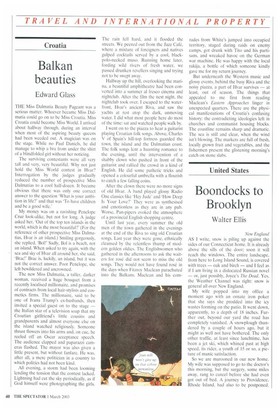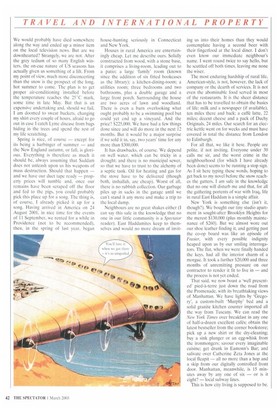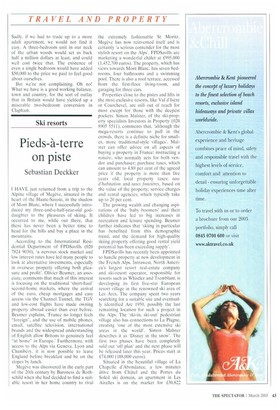United States
Boondocks to Brooklyn
Walter Ellis
New England AS I write, snow is piling up against the sides of our Connecticut home. It is already above the sills of the door: soon it will reach the windows. The entire landscape, from here to Long Island Sound, is covered with trees — oak and birch — and I feel as if I am living in a dislocated Russian novel — or, just possibly, Joyce's The Dead. Yes, the Weather Channel was right: snow is general all over New England.
My wife popped into my office a moment ago with an ornate iron poker that she says she prodded into the icy wastes forming on the patio. It went down, apparently, to a depth of 18 inches. Further out, beyond our yard the road has completely vanished. A snowplough thundered by a couple of hours ago, but it might as well not have bothered. The only other traffic, at least since lunchtime, has been a jet ski, which whined past at high speed, its rider, a youth of 15 or so, a picture of manic satisfaction.
So we are marooned in our new home. My wife was supposed to go to the doctor's this morning, but the surgery, some miles away, rang to cancel before she had even got out of bed. A journey to Providence, Rhode Island, had also to be postponed. We would probably have died somewhere along the way and ended up a minor item on the local television news. But are we downhearted? Strangely, we are not. After the grey tedium of so many English winters, the on-cue nature of US seasons has actually given us something of a lift. From my point of view, much more disconcerting than the snow is the prospect of the long, hot summer to come. The plan is to get proper air-conditioning installed before the temperature reaches the 25°C mark, some time in late May. But that is an expensive undertaking and, should we fail, I am doomed to sweat buckets, changing my shirt every couple of hours. afraid to go out in case I catch Lyme disease from bugs hiding in the trees and spend the rest of my life scratching.
Spring is nice, of course — except for its being a harbinger of summer — and the New England autumn, or fall, is glorious. Everything is therefore as much it should be, always assuming that Saddam does not unleash upon us his weapons of mass destruction. Should that happen — and we have our duct tape ready — property prices will tumble and, once our remains have been scraped off the floor and fed to the pigs, you could probably pick this place up for a song. The thing is, of course, I already picked it up for a song. Having arrived in America on 24 August 2001, in nice time for the events of 11 September, we rented for a while in Providence (not to be recommended), then, in the spring of last year, began house-hunting seriously in Connecticut and New York.
Houses in rural America are entertainingly cheap. Let me describe ours. Solidly constructed from wood, with a stone base, it comprises a living-room, leading out to a patio; a large 'family' room (known since the addition of six fitted bookcases as the library); a kitchen-dining-room; a utilities room; three bedrooms and two bathrooms, plus a double garage and a large front porch. Surrounding the house are two acres of lawn and woodland. There is even a barn overlooking what ought probably to be a swimming pool but could yet end up a vineyard. And the price? $225,000. We have had a few things done since and will do more in the next 12 months. But it would be a major surprise if we sold it in, say, two years' time for any more than $300,000.
It has drawbacks, of course. We depend on well water, which can be tricky in a drought; and there is no municipal sewer, so that we have to trust to the alchemy of a septic tank. Oil for heating and gas for the stove have to be delivered (though both, inshallah, are cheap). Worst of all, there is no rubbish collection. Our garbage piles up in sacks in the garage until we can't stand it any more and make a trip to the local dump.
Neighbours are no great shakes either (I can say this safe in the knowledge that no one in our little community is a Spectator reader). East Haddamites keep to themselves and would no more dream of invit
ing us into their homes than they would contemplate having a second beer with their fingerfood at the local diner. I don't even know our immediate neighbour's name. I went round twice to say hello, but he scuttled off both times, leaving me none the wiser.
The most enduring hardship of rural life, American-style, is not, however, the lack of company or the dearth of services. It is not even the abominable food served in most of the restaurants. It is the sheer distance that has to be travelled to obtain the basics of life: milk and a newspaper (if available), ten miles there and back; a caffe latte, 22 miles; decent cheese and a pack of Duchy Originals, 24 miles. Our search for an electric kettle went on for weeks and must have covered in total the distance from London to Edinburgh.
For all that, we like it here. People are polite, if not inviting. Everyone under 30 calls me sir, and the worst crime in the neighbourhood (for which I have already been done) seems to be running a stop sign. As I sit here typing these words, hoping to get back to my novel before the snow reaches the gutters, I am safe in the knowledge that no one will disturb me and that, for all the gathering portents of war with Iraq, life in rural East Haddam is a simple affair.
New York is something else (isn't it, though?). We bought our tiny studio apartment in sought-after Brooklyn Heights for the merest $130,000 (plus monthly maintenance of $260). But we almost wore out our shoe leather finding it, and getting past the co-op board was like an episode of Frasier, with every possible indignity heaped upon us by our smiling interrogators. The flat, when we were finally handed the keys, had all the interior charm of a morgue. It took a further $20.000 and three months of unremitting pressure on our contractor to render it fit to live in — and the process is not yet ended.
That said, we now boast a 'well presented' pied-a-terre just down the road from the Promenade, with its breathtaking views of Manhattan. We have lights by 'Gregory', a custom-built 'Murphy' bed and a solid granite kitchen counter imported all the way from Tuscany. We can read the New York Times over breakfast in any one of half-a-dozen excellent cafes; obtain the latest bestseller from the corner bookstore; pick up a new shirt or the dry-cleaning; buy a sink plunger or an egg-whisk from the ironmongers; savour every imaginable cuisine; get drunk in Eamonn's Bar; and salivate over Catherine Zeta Jones at the local fleapit — all no more than a hop and a skip from our digitally controlled front door. Manhattan, meanwhile, is 15 minutes away by any one of six — or is it eight? — local subway lines.
This is how city living is supposed to be. Sadly, if we had to trade up to a more adult apartment, we would not find it easy. A three-bedroom unit in our neck of the urban woods would set us back half a million dollars at least, and could well cost twice that. The existence of even a single bedroom would have added $50.000 to the price we paid to feel good about ourselves.
But we're not complaining. Oh no! What we have is a good working balance, town and country, for the sort of outlay that in Britain would have yielded up a miserable two-bedroom conversion in Clapham.




















































































 Previous page
Previous page